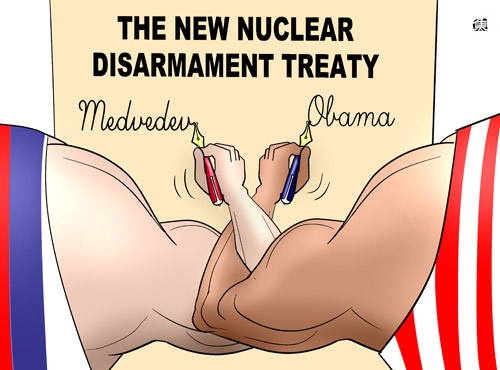Russia, U.S. must overcome history to 'reset' security ties
- By Fan Jishe
 0 Comment(s)
0 Comment(s) Print
Print E-mail China.org.cn, September 20, 2011
E-mail China.org.cn, September 20, 2011
On September 13, U.S. Secretary of State Hillary Clinton signed a ballistic missile defense agreement with visiting Romanian Foreign Minister Teodor Baconschi. This agreement calls for the establishment and operation of a U.S. land-based SM-3 ballistic missile defense (BMD) system in Romania. Meanwhile, the U.S.-Poland agreement on the BMD system came into effect. The aggressive actions of the U.S. have revealed its true intention to "reset" relations with Russia and strained bilateral ties on security.
|
|
| Still arm wrestling? [By Jiao Haiyang/China.org.cn] |
There are three important issues which affect the US and Russia with respect to the missile defense system. The first issue is over the scale and strength of missile interceptors in Europe. Russia hopes the missile defense system is just for countering threats from Iran and North Korea (as the US claims), not an unlimited and proliferated system. Second, Russia hopes to establish a joint missile defense system with the United States and NATO, where all three parties are on an equal footing. But neither the U.S. nor NATO wishes to share European security interests with Russia. They do not want Russia to have the keys to the European missile defense system.. The third issue relates to whether or not the U.S. and NATO can make binding promises to Russia guaranteeing that Russia itself will not be the target of their missile defense systems.
These issues are steeped in history. During the Cold War, a missile defense system concerning the credibility and effectiveness of a nuclear deterrent was the key to keep a "balance of terror" between the United States and the Soviet Union. Both parties signed the Treaty on the Limitation of Anti-Ballistic Missile Systems to temporarily settle these issues. In the first decade after the Cold War, the U.S. applied itself to improving the capacity of its BMD systems in war zones. Neither side made much progress with respect to the amendment or nullification of the treaty. After the September 11 terrorist attacks in 2001, the Bush administration withdrew from the treaty. Due to the global situation regarding terrorism at the time, Russia tacitly supported this decision. However, the missile defense system has always been a stumbling block when it comes to bilateral ties.
Russia's fears regarding U.S. ballistic missile defense systems are deeply rooted. Russia is not concerned about the current construction and deployment of missile defense systems, because these systems are still a couple of years away from completion. Moreover, only 50 percent of U.S. land-based interception tests have been successful since 1999. Russia's real worry is the unroofed capacity of BMD systems. Although Europe's SM-3 ballistic missile is currently incapable of intercepting Russia's intercontinental ballistic missile (ICBM), this may change by 2020, by which time the European missile will have been updated. According to figures issued by the U.S. State Council in early June, Russia has only 1,537 strategic nuclear warheads which are deployed on 521 carriers. This indicates that Russia has reached its agreed level since the nuclear disarmament treaty it signed with the U.S last year came into effect. The reduction gives Russia enough reason to worry about the construction of U.S. BMD systems.
Compared with its strength during the Cold War and the immediate years following the Cold War, Russia has lowered its profile on the BMD issue. What it needs now is a stable and future-oriented strategic relationship with the U.S. which is based on equality. However, despite the fine words which have emerged from recent meetings between Russia and the U.S. and Russia and NATO, none of Russia's needs are being met.
On the face of it, things seemed positive for Russia. President Obama vowed to "reset" U.S.-Russia ties and expressed his desire to increase cooperation with Russia on strategic issues. However, much of this is empty rhetoric. We have heard talk about the "reset" but no action has been forthcoming. If Russia's reasonable concerns regarding BMD cannot be properly addressed, it is unlikely that we will see any meaningful future cooperation between the U.S. and Russia on issues such as nuclear disarmament, anti-terrorism and non-proliferation. History tells us that defense ties between the US and Russia are shaky. Instead of seeing frequent meetings and summits and hearing positive language from joint declarations, we see instead a history of competitiveness and strategic self-interest. Therefore, the ability, or inability, of both sides to cooperate on the issue of BMD systems will shape the future of their bilateral security ties.
The author is a columnist with China.org.cn. For more information please visit:
http://www.ccgp-fushun.com/opinion/fanjishe.htm
Opinion articles reflect the views of their authors, not necessarily those of China.org.cn.






